API Freshwater Master Test Kit
What is the API Freshwater Master Test Kit?
The API Freshwater Master Test Kit is a water testing kit designed for use in freshwater aquariums. It allows aquarium owners to monitor the levels of various chemical parameters in their aquarium water, including pH, ammonia, nitrite, and nitrate. The kit contains everything needed to perform these tests, including test tubes, color-coded reagents, and a color chart for interpreting the test results.
Monitoring the water quality in your aquarium is essential for the health of your fish and other aquatic life. High levels of ammonia, nitrite, or nitrate can be toxic to fish and other aquatic organisms, leading to health problems or even death. High or low pH levels can also be harmful to fish and plants, affecting their ability to grow and thrive.
The API Freshwater Master Test Kit is easy to use, with clear instructions provided for each test. To perform a test, you simply need to fill a test tube with a water sample from your aquarium, add the appropriate reagent to the tube, and then compare the color of the solution to the color chart included with the kit. The color chart will indicate the concentration of the tested parameter in parts per million (ppm).
The API Freshwater Master Test Kit is suitable for use in both new and established aquariums. New aquariums may experience spikes in ammonia and nitrite levels as the aquarium cycles and establishes a biological filtration system. Regular testing during this period can help you monitor the progress of the cycle and prevent any harm to your fish.
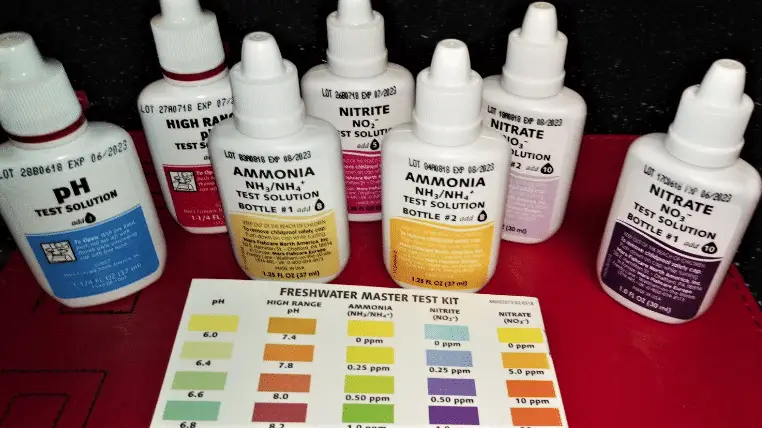
How often should I test my water?
The frequency with which you should test your aquarium water depends on several factors, including the size of your aquarium, the number of fish and other aquatic organisms you have, and the overall stability of your aquarium environment.
As a general guideline, it’s recommended that you test your aquarium water at least once a week. This will help you monitor the levels of key parameters such as pH, ammonia, nitrite, and nitrate, and identify any potential problems before they become serious.
In some cases, you may need to test your water more frequently. For example, if you have a new aquarium that is still cycling, you may need to test your water every day or every other day to monitor the progress of the cycling process and ensure that ammonia and nitrite levels are not becoming too high.
If you notice any problems with your fish or plants, such as unusual behavior, poor growth, or signs of disease, you should test your water immediately to identify and correct any issues.
Ultimately, the frequency with which you should test your water depends on your specific aquarium and the needs of your fish and other aquatic organisms. By monitoring your water regularly and taking appropriate action to correct any issues that may arise, you can ensure the long-term health and well-being of your aquarium inhabitants.
Links to Amazon where you can buy all this stuff and please note I am only listing things I have used.
API 800 Test Freshwater Aquarium Water Master Test Kit
Replacement reagents for the API Tests
API NITRATE 90-Test Freshwater and Saltwater Aquarium Water Test Kit
API CARBONATE HARDNESS TEST KIT Aquarium Water Test Kit
API HIGH RANGE PH TEST KIT 160-Test Freshwater and Saltwater Aquarium Water Test Kit
API PH TEST KIT 250-Test Freshwater Aquarium Water pH Test Kit
API NITRITE TEST KIT 180-Test Freshwater and Saltwater Aquarium Test Kit
KIT 180-Test Freshwater and Saltwater Aquarium Test Kit
API GH & KH TEST KIT Freshwater Aquarium Water Test Kit
API AMMONIA TEST STRIPS Freshwater and Saltwater Aquarium Water Test Strips 25
If you have a pond, this master test kit might be better for you.
API 500 Pond Master Test Kit for Pond Water
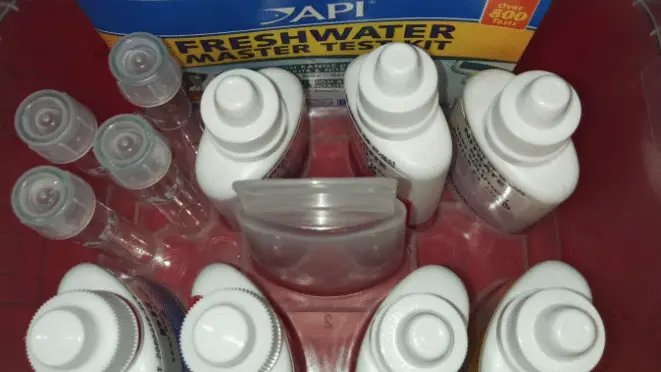
How long do the test kits last?
The API Freshwater Master Test Kit contains enough reagents to perform approximately 800 tests, depending on usage. However, the lifespan of the tests can vary depending on factors such as how often you test your water, how much water you test each time, and how accurate you are when measuring the reagents.
To get the most out of your API Freshwater Master Test Kit, it’s essential to follow the instructions carefully and use the appropriate amount of reagent for each test. You should also store the kit properly in a cool, dry place, away from direct sunlight and heat sources, and keep the reagents tightly capped when not in use.
If you find that you are running out of reagents sooner than expected, you can purchase refill kits or replacement reagents from API to extend the life of your kit. Overall, with proper care and usage, the API Freshwater Master Test Kit can provide accurate and reliable testing for your aquarium water for a significant period of time.
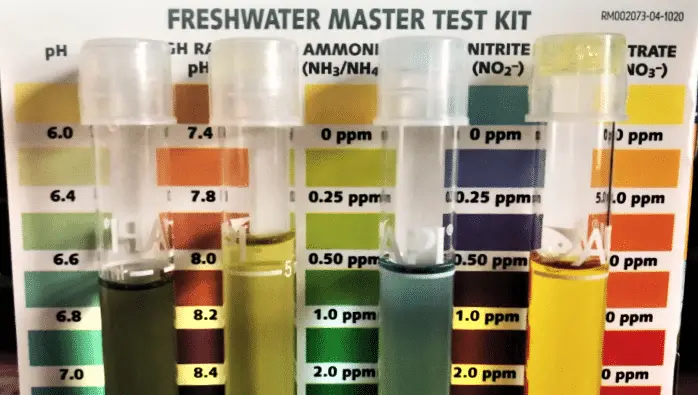
Are API test kits accurate?
API test kits are generally considered to be accurate and reliable when used correctly and according to the instructions provided. They are widely used and trusted by aquarium hobbyists and professionals alike.
However, it’s important to note that the accuracy of the test results can be affected by factors such as expired reagents, improper storage, or contamination of the test sample.
To ensure the most accurate results possible, it’s important to follow the instructions carefully and use the appropriate amount of reagent for each test. It’s also important to store the test kit properly in a cool, dry place, away from direct sunlight and heat sources, and keep the reagents tightly capped when not in use.
Additionally, it’s a good idea to periodically check the accuracy of your API test kit by comparing your results to those obtained using a different test kit or method. This can help you identify any potential issues with your kit or testing procedure and ensure that you are getting accurate and reliable results.
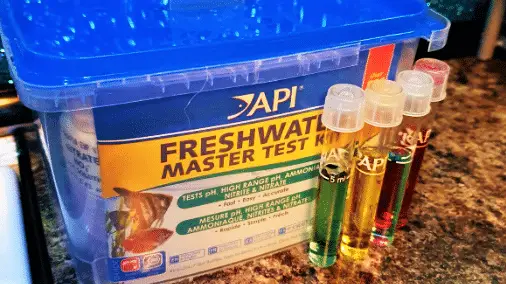
Is the API Master Test Kit worth it?
Yes, the API Freshwater Master Test Kit is generally considered to be a worthwhile investment for anyone who owns a freshwater aquarium.
It provides accurate and reliable testing for key chemical parameters in your aquarium water, including pH, ammonia, nitrite, and nitrate, which are important for maintaining a healthy environment for your fish and other aquatic life.
By regularly testing your aquarium water with the API Freshwater Master Test Kit, you can identify and correct any issues that may arise before they become serious problems. This can help you prevent fish illness and death, avoid problems with algae growth, and maintain a healthy and thriving aquarium environment for your aquatic inhabitants.
While the cost of the kit may seem high initially, it is important to consider the long-term benefits of maintaining a healthy aquarium environment. The API Freshwater Master Test Kit contains everything needed to perform comprehensive water tests, and with proper usage and care, it can provide accurate and reliable testing for a significant period.
How do you dispose of the water in the test tube after the testing?
Dilute the chemicals with some aquarium water and pour down the drain.
How do you clean the test tubes after you have used them?
I flush with warm water and use a little test tub cleaner like this to clean the inside, just remember not to push too hard or you can smash the test tube.
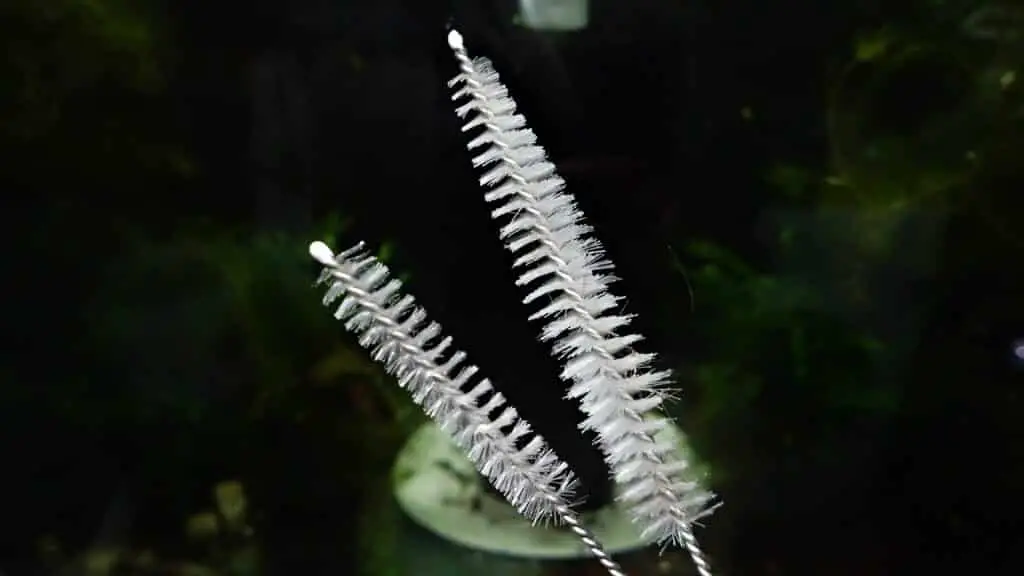
What about product safety?
The API Freshwater Master Test Kit is generally considered safe to use when handled according to the instructions provided. The reagents included in the kit are designed to be safe for use in freshwater aquariums and are not known to pose any significant health risks to humans or aquatic life when used as directed.
However, it is important to handle the reagents with care and avoid direct contact with your skin or eyes. If you accidentally come into contact with the reagents, immediately rinse the affected area with plenty of water and seek medical attention if necessary.
It’s also important to note that the API Freshwater Master Test Kit is designed for use in freshwater aquariums only. Using the kit in a saltwater aquarium or in any other manner not recommended by the manufacturer can lead to inaccurate results or potentially harmful interactions with other chemicals in the water.
The API Freshwater Master Test Kit is a popular choice for aquarium owners on Amazon, with thousands of units sold. This popularity speaks to the product’s effectiveness and reliability in providing accurate and comprehensive testing for key chemical parameters in freshwater aquariums
FAQ
Q: What is the API Freshwater Master Test Kit? A: The API Freshwater Master Test Kit is a comprehensive water testing kit for freshwater aquariums. It includes tests for pH, ammonia, nitrite, and nitrate levels in the water.
Q: How do I use the API Freshwater Master Test Kit? A: The kit comes with instructions on how to use each test. Generally, you’ll need to fill the test tube with water from your aquarium, add the appropriate reagent to the tube, and then compare the color of the solution to the chart included with the kit to determine the concentration of the tested parameter.
Q: Why is it important to test the water in my aquarium? A: Testing the water in your aquarium is important because it allows you to monitor the levels of various parameters that can affect the health of your fish and other aquatic life. For example, high levels of ammonia or nitrite can be toxic to fish, while high levels of nitrate can promote algae growth.
Q: How often should I test my aquarium water with the API Freshwater Master Test Kit? A: You should test your aquarium water with the API Freshwater Master Test Kit at least once a week, and more frequently if you notice any problems with your fish or plants.
Q: How long does the API Freshwater Master Test Kit last? A: The kit contains enough tests to last for approximately 800 tests, depending on usage.
Q: Can the API Freshwater Master Test Kit be used for saltwater aquariums? A: No, the API Freshwater Master Test Kit is specifically designed for freshwater aquariums. API also makes a separate kit for testing saltwater aquariums.
Q: What do I do if my test results are outside the recommended range? A: If your test results are outside the recommended range, you should take action to correct the problem. For example, if your ammonia levels are high, you may need to do a water change to dilute the ammonia. Consult with a knowledgeable aquarium expert or pet store employee for guidance on how to correct the problem.
Q: How do I store the API Freshwater Master Test Kit? A: The kit should be stored in a cool, dry place, away from direct sunlight and heat sources. The reagents should be kept tightly capped when not in use.
